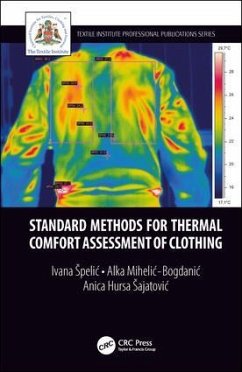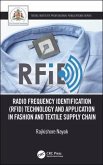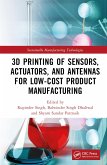Ivana Spelic (University of Zagreb Faculty of Textile Technology), Alka Mihelic-Bogdanic (University of Faculty of Textile Technology, Anica Hursa Sajatovic (Faculty of Textile Tec University of Zagreb
Standard Methods for Thermal Comfort Assessment of Clothing
Ivana Spelic (University of Zagreb Faculty of Textile Technology), Alka Mihelic-Bogdanic (University of Faculty of Textile Technology, Anica Hursa Sajatovic (Faculty of Textile Tec University of Zagreb
Standard Methods for Thermal Comfort Assessment of Clothing
- Gebundenes Buch
- Merkliste
- Auf die Merkliste
- Bewerten Bewerten
- Teilen
- Produkt teilen
- Produkterinnerung
- Produkterinnerung
Providing analysis of the thermal comfort assessment of clothing as the basis for developing standards, this book discusses the thermal protective role of clothing as a way of modelling heat transfer from the body, general thermal regulation of humans and the importance of globally accepted test methods and standards to improve quality.
Andere Kunden interessierten sich auch für
![Digital Fashion Innovations Digital Fashion Innovations]() Digital Fashion Innovations87,99 €
Digital Fashion Innovations87,99 €![Textile Design Textile Design]() Michael Hann (School of Design, University of Leeds, UK)Textile Design69,99 €
Michael Hann (School of Design, University of Leeds, UK)Textile Design69,99 €![The Cause, Effect, and Control of Accidental Loss The Cause, Effect, and Control of Accidental Loss]() Ron C. McKinnonThe Cause, Effect, and Control of Accidental Loss87,99 €
Ron C. McKinnonThe Cause, Effect, and Control of Accidental Loss87,99 €![Thermal Energy Systems Thermal Energy Systems]() Thermal Energy Systems151,99 €
Thermal Energy Systems151,99 €![Radio Frequency Identification (RFID) Technology and Application in Fashion and Textile Supply Chain Radio Frequency Identification (RFID) Technology and Application in Fashion and Textile Supply Chain]() Rajkishore Nayak (Vietnam RMIT University)Radio Frequency Identification (RFID) Technology and Application in Fashion and Textile Supply Chain162,99 €
Rajkishore Nayak (Vietnam RMIT University)Radio Frequency Identification (RFID) Technology and Application in Fashion and Textile Supply Chain162,99 €![Early American Children's Clothing and Textiles Early American Children's Clothing and Textiles]() Carey Blackerby HansonEarly American Children's Clothing and Textiles45,99 €
Carey Blackerby HansonEarly American Children's Clothing and Textiles45,99 €![3D Printing of Sensors, Actuators, and Antennas for Low-Cost Product Manufacturing 3D Printing of Sensors, Actuators, and Antennas for Low-Cost Product Manufacturing]() 3D Printing of Sensors, Actuators, and Antennas for Low-Cost Product Manufacturing93,99 €
3D Printing of Sensors, Actuators, and Antennas for Low-Cost Product Manufacturing93,99 €-
-
-
Providing analysis of the thermal comfort assessment of clothing as the basis for developing standards, this book discusses the thermal protective role of clothing as a way of modelling heat transfer from the body, general thermal regulation of humans and the importance of globally accepted test methods and standards to improve quality.
Produktdetails
- Produktdetails
- Textile Institute Professional Publications
- Verlag: Taylor & Francis Ltd
- Seitenzahl: 228
- Erscheinungstermin: 25. Juni 2019
- Englisch
- Abmessung: 163mm x 240mm x 19mm
- Gewicht: 514g
- ISBN-13: 9781138391475
- ISBN-10: 1138391476
- Artikelnr.: 57052861
- Textile Institute Professional Publications
- Verlag: Taylor & Francis Ltd
- Seitenzahl: 228
- Erscheinungstermin: 25. Juni 2019
- Englisch
- Abmessung: 163mm x 240mm x 19mm
- Gewicht: 514g
- ISBN-13: 9781138391475
- ISBN-10: 1138391476
- Artikelnr.: 57052861
Ivana peli¿, Ph.D. was born in Croatia in 1982. She received her Master's degree as the Engineer of Textile Technology in 2009 at University of Zagreb, Faculty of Textile Technology. The same year she became the research associate at the Department of Clothing Technology and finished postgraduate scientific doctoral study Textile Science and Technology in 2016. Her research activities are in the field of textile technology and engineering, clothing technology, energetics, technical thermodynamics, energy management in industry and new and renewable energy sources. Alka Miheli¿-Bogdani¿, PhD was born in Zagreb and works as full professor at the University of Zagreb, Faculty of Textile Technology. She received her bachelor's degree in the year 1972, her master's degree in the year 1975 and her doctor's degree in the year 1977 from Zagreb University, Faculty of Technology. Her research activities are in the field of chemical engineering, textile technology and energetics. The areas of special research interest are energetics, technical thermodynamics, energy management in industry and new and renewable energy sources. From 1984 to 2000, she has collaborated with the Institute for Thermodynamic at the Technical University Graz and with the Institute for Physics at the Karl Franz University Graz, in the field of alternative energy sources as well as Stirling engine. She has published over 121 scientific papers with international reviews and 13 professional papers. Anica Hursa is Head of the Department of Clothing Technology at University of Zagreb, Faculty of Textile Technology.
1. Introduction. 2. Behind the Scenes: Thermal Regulation in Humans. 3.
Modelling the Heat Losses from the Human Body. 4. The Importance of
Globally Accepted Test Methods and Standards. 5. The Standardization on
Thermal Comfort. 6. Who Creates Standards? 7. The Standardisation on
Thermal Comfort. 8. The Distribution of Standards on Thermal Comfort. 9.
The Overview of the Most Significant Standards on Thermal Comfort. 10.
Conclusion. 11. References. 12. Dictionary: Basic Terms and Units.
Modelling the Heat Losses from the Human Body. 4. The Importance of
Globally Accepted Test Methods and Standards. 5. The Standardization on
Thermal Comfort. 6. Who Creates Standards? 7. The Standardisation on
Thermal Comfort. 8. The Distribution of Standards on Thermal Comfort. 9.
The Overview of the Most Significant Standards on Thermal Comfort. 10.
Conclusion. 11. References. 12. Dictionary: Basic Terms and Units.
1. Introduction. 2. Behind the Scenes: Thermal Regulation in Humans. 3.
Modelling the Heat Losses from the Human Body. 4. The Importance of
Globally Accepted Test Methods and Standards. 5. The Standardization on
Thermal Comfort. 6. Who Creates Standards? 7. The Standardisation on
Thermal Comfort. 8. The Distribution of Standards on Thermal Comfort. 9.
The Overview of the Most Significant Standards on Thermal Comfort. 10.
Conclusion. 11. References. 12. Dictionary: Basic Terms and Units.
Modelling the Heat Losses from the Human Body. 4. The Importance of
Globally Accepted Test Methods and Standards. 5. The Standardization on
Thermal Comfort. 6. Who Creates Standards? 7. The Standardisation on
Thermal Comfort. 8. The Distribution of Standards on Thermal Comfort. 9.
The Overview of the Most Significant Standards on Thermal Comfort. 10.
Conclusion. 11. References. 12. Dictionary: Basic Terms and Units.








